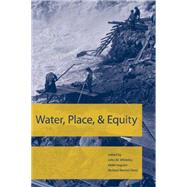
| Series Foreword | p. ix |
| Acknowledgments | p. xi |
| The Importance of Equity and the Limits of Efficiency in Water Resources | p. 1 |
| Water, Place, and Equity | p. 33 |
| The San Luis Valley and the Moral Economy of Water | p. 37 |
| Ethical Issues in Storm Water Policy Implementation | p. 69 |
| Disparities in Financial Burdens and Overall Benefits | |
| Equity and Water in Mexico's Changing Institutional Landscape | p. 95 |
| From Equitable Utilization to Sustainable Development | p. 117 |
| Advancing Equity in U.S.-Mexico Border Water Management | |
| Developing a Plentiful Resource | p. 147 |
| Transboundary Rivers in the Pacific Northwest | |
| Civic Engagement and Governance | p. 189 |
| The Global Water Crisis, Privatization, and the Bolivian Water War | p. 195 |
| Modernizing Mountain Water | p. 225 |
| State, Industry, and Territory | |
| Whose Water Is It Anyway? | p. 249 |
| Water Management, Knowledge, and Equity in Northeast Brazil | |
| Water and Equity in a Changing Climate | p. 271 |
| List of Contributors | p. 309 |
| Index | p. 313 |
| Table of Contents provided by Publisher. All Rights Reserved. |
The New copy of this book will include any supplemental materials advertised. Please check the title of the book to determine if it should include any access cards, study guides, lab manuals, CDs, etc.
The Used, Rental and eBook copies of this book are not guaranteed to include any supplemental materials. Typically, only the book itself is included. This is true even if the title states it includes any access cards, study guides, lab manuals, CDs, etc.